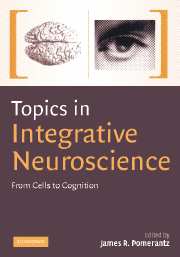Book contents
- Frontmatter
- Contents
- List of contributors
- Preface
- Overview of neuroscience, choice and responsibility
- 1 Neuroscience, choice and responsibility
- PART I HIGHER ORDER PERCEPTION
- PART II LANGUAGE
- PART III MEMORY SYSTEMS
- Introduction to Memory Section
- 9 Memory systems
- 10 A brain system for declarative memory
- 11 The role of the lateral nucleus of the amygdala in auditory fear conditioning
- 12 On crucial roles of hippocampal NMDA receptors in acquisition and recall of associative memory
- PART IV SENSORY PROCESSES
- Index
- Plate section
Introduction to Memory Section
Published online by Cambridge University Press: 08 August 2009
- Frontmatter
- Contents
- List of contributors
- Preface
- Overview of neuroscience, choice and responsibility
- 1 Neuroscience, choice and responsibility
- PART I HIGHER ORDER PERCEPTION
- PART II LANGUAGE
- PART III MEMORY SYSTEMS
- Introduction to Memory Section
- 9 Memory systems
- 10 A brain system for declarative memory
- 11 The role of the lateral nucleus of the amygdala in auditory fear conditioning
- 12 On crucial roles of hippocampal NMDA receptors in acquisition and recall of associative memory
- PART IV SENSORY PROCESSES
- Index
- Plate section
Summary
Memory is a large topic, built on the fundamental idea that the experiences one has can change the nervous system, so that behavior and mental activity can later be different as a result of what came before. Yet, memory is more than a record of personal experience. Humans can learn and then teach what they have learned to others, thereby making it possible to transmit information from one generation to another.
In the twentieth century the study of memory became part of the domains of both biological and psychological science. Work has proceeded at several levels of analysis – from questions about the cellular and molecular events that underlie synaptic change to questions about complex behavior. Between these poles are other important questions, such as what brain systems are important for memory and how they operate to support memory. As we enter the new millennium, biology and psychology have converged on a number of fundamental questions about memory. Is memory one thing or many? If there are different kinds of memory, what are their operating characteristics? Where in the brain do the important events occur? Where is memory stored? What happens at the level of individual cells and synapses?
The modern era of memory research can be said to have begun in 1957 when the effects on memory of medial temporal lobe resection were described in a patient who became known as HM. HM exhibited profound forgetfulness against a background of largely intact intellectual and perceptual functions.
- Type
- Chapter
- Information
- Topics in Integrative NeuroscienceFrom Cells to Cognition, pp. 239 - 242Publisher: Cambridge University PressPrint publication year: 2008



